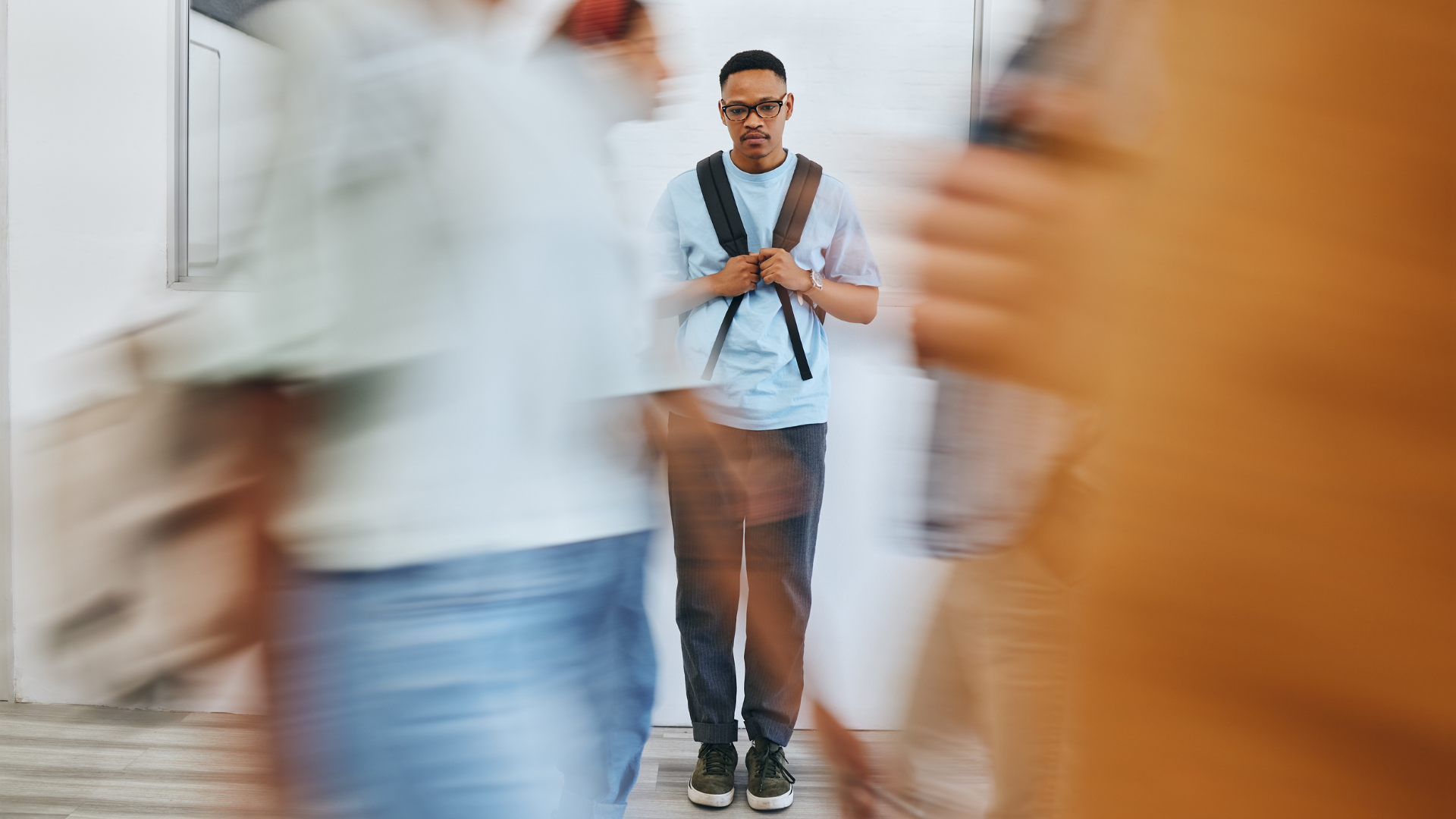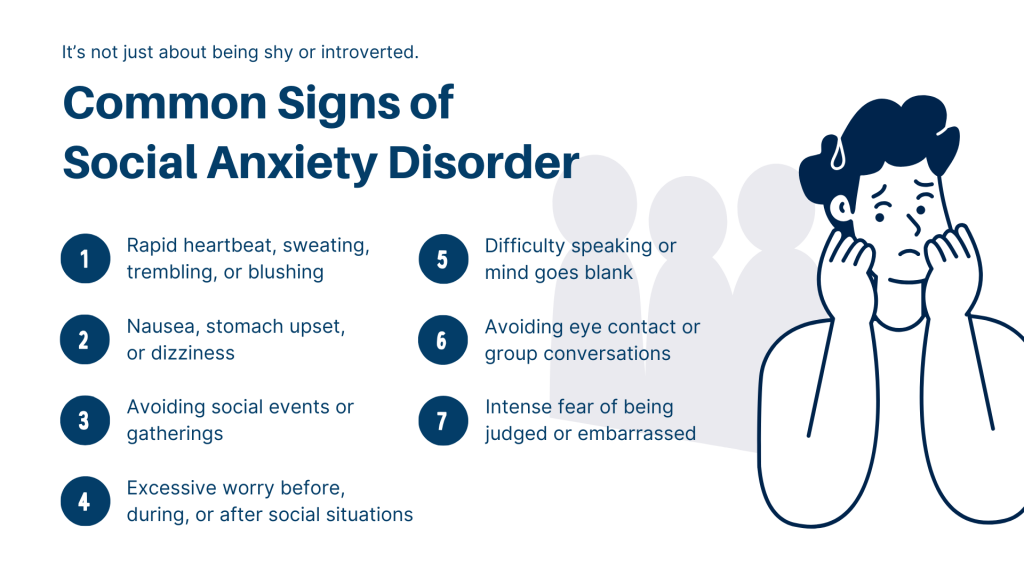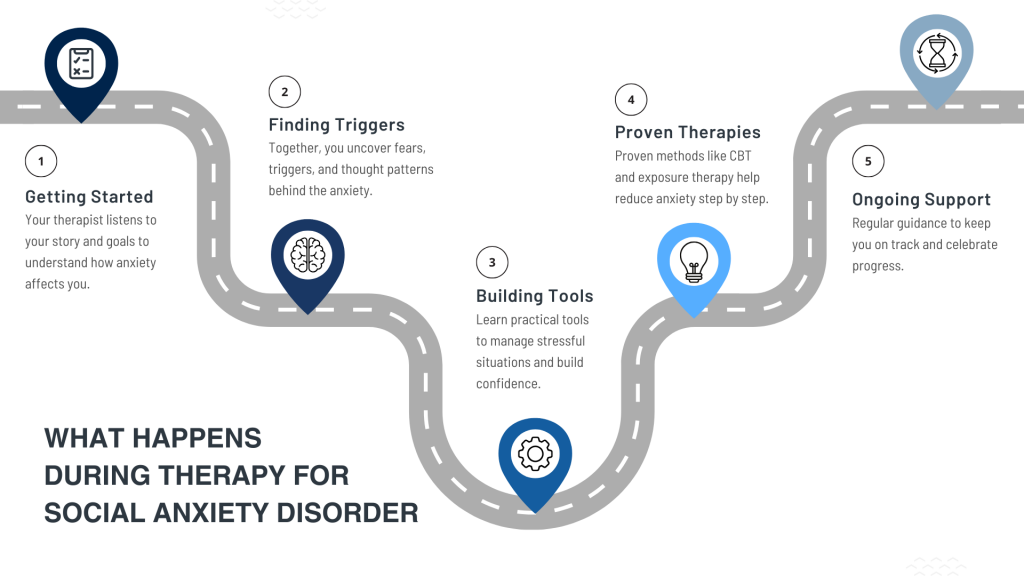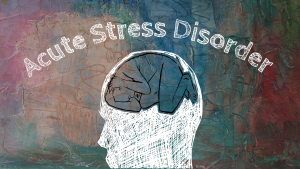13-9, 2 Rio Tower, Persiaran Rio, Bandar Puteri, 47100 Puchong, Selangor, Malaysia.

How to Overcome Social Anxiety: Signs, Causes, and Steps Toward Confidence
- On
- InUncategorized
Do you ever find yourself avoiding gatherings, worrying you’ll say the wrong thing—or replaying conversations long after they’re over? For some, this feels like ordinary shyness. But for many Malaysians—parents watching their child struggle with friendships, adults feeling uneasy after years of isolation during the pandemic, or older loved ones re-entering social circles—these worries may be signs of social anxiety.
The big question is: is this just nervousness, or something deeper? Understanding social anxiety is the first step to overcoming it. In this guide, you’ll learn the signs of anxiety, its causes, and proven ways to manage it—whether for yourself or someone you care about.
What Is Social Anxiety and Why Does It Happen?
Social anxiety disorder (SAD) is more than being shy or introverted. Unlike the natural nervousness we feel when meeting new people, SAD triggers a persistent fear of being judged or embarrassed that can interfere with everyday life.
For someone with social anxiety, simple things—like joining a conversation, making a phone call, or even eating in public—can feel overwhelming. Children may be reluctant to raise their hands in class. Adults may withdraw from office networking. Seniors may feel anxious about reconnecting socially after long periods of isolation.
So why does it happen? Research points to several causes:
- Genetics and family history: SAD can be inherited.
- Brain chemistry: Overactive amygdala (the brain’s fear centre) and imbalances in serotonin can heighten fear responses.
- Childhood experiences: Bullying, harsh criticism, or strict parenting can leave lasting anxiety.
- Cultural pressures: In Malaysia, expectations surrounding academic success, family reputation, and career status can amplify the fear of judgment.
💡 Remember: social anxiety is not a weakness. It has real biological, psychological, and cultural roots—and with the right support, it can be understood, managed, and improved.
Key Signs of Anxiety in Social Situations
If you’re unsure whether what you (or your child) are feeling is just shyness or social anxiety disorder, look out for these signs:
- Physical signs
- Blushing or sweating excessively
- Trembling hands or shaky voice
- Racing heartbeat or nausea
- Emotional signs:
- Fear of being judged or humiliated
- Overthinking past conversations (“Did I sound silly?”)
- Intense worry days before social events
- Behavioural signs
- Avoiding phone calls, presentations, or even casual meetups
- Skipping events – even family ones – you secretly wanted to attend
- Isolating yourself after losing touch during the pandemic
💭 Do these feel familiar to you or someone you love?

📌Tip: Identifying these signs is the first step toward healing. Once you name the patterns, you can start reshaping them.
How to Overcome Social Anxiety: Step-by-Step Guidance
While there’s no “quick fix,” consistent effort and support can make a real difference. Here are research-backed strategies that work:
- Cognitive Behavioural Therapy (CBT)
Learn to challenge distorted thoughts like “Everyone thinks I’m awkward” and replace them with realistic ones.
- Gradual Exposure
Start small, such as saying hello to a colleague, and then gradually build up to larger social situations. Each step reduces fear over time.
- Breathing & Mindfulness
Use deep breathing or grounding exercises to calm your body’s stress response in anxious moments.
- Positive Self-Talk & Journaling
Reframe your inner dialogue. Writing down your triggers and small wins helps track progress and build self-confidence.
- Social Skills Training
Role-playing common scenarios (job interviews, ordering food in a restaurant) builds confidence in safe practice before facing them in real life.
🌱 Progress may be gradual, but with consistency, confidence grows steadily.
When to Seek Professional Help and Why It Helps
If social anxiety is disrupting your work, studies, or relationships, professional support can speed up recovery. A therapist can:
- Personalise coping strategies to your unique triggers
- Provide structured approaches like CBT or exposure therapy
- Track progress in a safe, supportive environment
For many, therapy prevents relapse and helps build confidence faster than trying to “push through” alone. In Malaysia, resources are increasingly available. Mental health service centres like Skybi offer support for individuals struggling with social anxiety.

Why Skybi Is a Safe First Step for Malaysians with Social Anxiety
Reaching out for help may feel intimidating—especially if you’ve avoided social interactions for years. That’s why Skybi provides options that are both safe and accessible:
✅ Online assessments to understand your social anxiety better
✅ Licensed therapists who provide structured, evidence-based support
✅ A confidential, judgment-free space to share your experiences at your own pace
Because sessions can be done online, you can take the first step toward healing without the added stress of stepping outside your comfort zone.
Reclaiming Your Confidence
Overcoming social anxiety is a journey. It begins with recognising the signs, understanding the causes, and taking one step at a time toward healing.
You don’t have to do it alone. Whether you’re a parent worried about your child, someone rebuilding social confidence after the pandemic, or simply unsure if your shyness is something more, support is available.
👉 Take the first step today with our Social Anxiety Assessment.
💬 Prefer a private chat? Reach out to us anytime on WhatsApp for confidential help: Chat With Us Now
Written by Wei Xin on 20 August 2025







